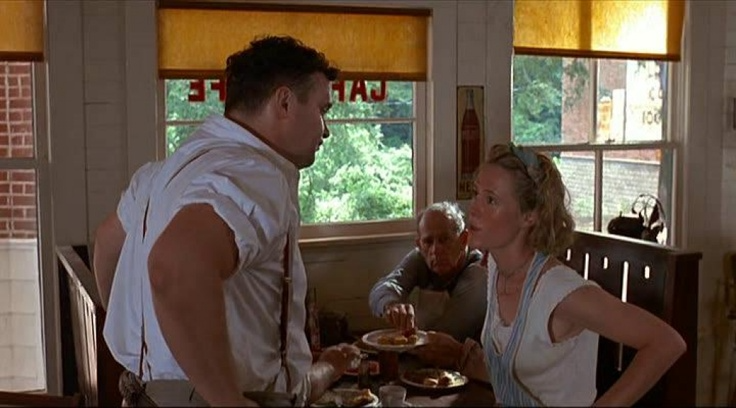
Fried Green Tomatoes (1991) is much more than a film about love, friendship, and survival. It also serves as a powerful reflection of the social and historical context in which its characters live. Set against the backdrop of the American South during the Great Depression, World War II, and the Civil Rights Movement, the film explores how the personal lives of its characters are shaped and challenged by these pivotal moments in history.
The story is a poignant reminder that individuals are often deeply affected by the society in which they live, especially in an era where rigid social structures and oppressive norms governed nearly every aspect of life. Through its characters, Fried Green Tomatoes not only tells the story of personal transformation but also highlights the deep impact that societal pressures and historical events have on identity, relationships, and choices.
The Great Depression: A Time of Hardship and Resilience
One of the most critical historical periods in Fried Green Tomatoes is the Great Depression. Set in the 1930s, the characters in Whistle Stop are forced to navigate economic collapse, poverty, and food scarcity, which deeply affect their daily lives and the choices they make.
In this context, the Whistle Stop Café becomes more than just a place to eat; it is a lifeline for the community. As the economic downturn ravages the town, the café serves as a refuge, a place where people can come together to share a meal, laugh, and find solace. Idgie Threadgoode, the café’s fearless owner, embodies resilience in the face of hardship. Her ability to keep the café running, despite financial difficulties and societal pressures, is a testament to her strength and defiance of the oppressive forces of the time.
Idgie’s resilience is in stark contrast to the social norms of the era, which dictated strict gender roles and limited opportunities for women. In the context of the Great Depression, where many women were expected to maintain a humble, subservient role, Idgie’s refusal to conform becomes an act of rebellion. By running the café, maintaining her independence, and forming a bond with Ruth, she challenges the patriarchal structure of society.

Gender Roles and Feminism in the 1930s South
Fried Green Tomatoes is also a commentary on the gender dynamics of the time, especially in the South. The film subtly critiques the rigid gender roles that women were expected to adhere to in the early 20th century. Women like Ruth Jamison, who initially appear to fit into traditional roles of femininity and passivity, ultimately prove to be much more complex and independent than society allows them to be.
Ruth’s journey is one of self-liberation. When she arrives in Whistle Stop, she is an abused wife who has been told by society that she has no agency over her life. However, her relationship with Idgie, her role in the café, and her growing confidence lead her to realize that she has the power to change her own life. Through Ruth’s transformation, the film showcases how women, even in the most restrictive environments, can find a way to reclaim their autonomy.
Idgie, too, challenges the gender expectations of the time. Her defiant nature, refusal to marry, and pursuit of her own happiness suggest a rejection of the societal norms that pressured women to conform to certain ideals. Her love and loyalty to Ruth is another act of resistance, as their bond does not fit the heteronormative framework that was widely accepted in the South during the 1930s.
The Civil Rights Movement: A Silent Yet Powerful Influence
While Fried Green Tomatoes does not focus explicitly on the Civil Rights Movement, the film’s setting in the South during the 1930s and 1940s places it in the heart of racial tension. The quiet but powerful presence of Sipsey, the African-American cook at the Whistle Stop Café, serves as a reminder of the racial inequalities that shaped the lives of Black people in the American South.
Though Sipsey’s role in the café is one of service, her strength and dignity cannot be overlooked. In a time when Black people were often relegated to the margins of society, Sipsey represents the perseverance and resilience of a community that refused to be silenced. She forms a deep, familial bond with the white women of the café, defying the societal norms of segregation. Sipsey’s relationship with the other characters illustrates the possibility of cross-racial solidarity during a period of deep social divide.
Sipsey’s experience highlights how racial discrimination and oppression were deeply entrenched in the South at the time. Yet, despite the societal barriers, she retains her sense of self-worth, and her quiet strength adds another layer to the theme of personal transformation that runs throughout the film.
Breaking Free: The Impact of Social Change on Personal Identity
Fried Green Tomatoes is not just a film about personal triumphs but also about the ways in which society’s evolving values influence personal growth. As the film progresses, particularly in its portrayal of Evelyn’s transformation, we see how historical and societal change can create opportunities for personal liberation. Evelyn’s journey from a discontented housewife to a self-assured, empowered woman is reflective of the broader cultural shifts taking place in the United States during the 1960s and 1970s.
As Evelyn begins to accept herself and challenge the limitations imposed on her by society, she becomes more in tune with the values of independence, equality, and self-expression that were gaining ground during this time. Her evolution mirrors the women’s liberation movement and the cultural revolution that were reshaping the social fabric of the nation. Through Evelyn’s eyes, we see how the changing world outside can inspire and fuel the change within.
The Enduring Legacy of the Past on the Present
Fried Green Tomatoes demonstrates that history and society never truly leave us. The characters in the film, whether they live in the past or present, are profoundly shaped by the historical context they inhabit. The choices they make are informed by the circumstances of their time, and the bonds they form are a reflection of the complex social dynamics that surround them.
In many ways, the film is a conversation between generations. Ninny’s retelling of the stories from Whistle Stop serves as a way of connecting the past to the present, reminding us that we carry the weight of history in our hearts and actions. Whether we are directly affected by the events of the past or simply influenced by their ripple effects, the stories of those who came before us continue to shape who we are.
Conclusion: The Interplay of Society, History, and Personal Identity
Fried Green Tomatoes stands as a poignant reminder that our lives are intertwined with the social and historical contexts we live in. The characters in the film may be shaped by the time periods they live through, but their stories of strength, resistance, and transformation transcend the confines of their era. In the end, the film shows us that while we are influenced by the world around us, we also have the power to reshape our own narratives — and in doing so, influence the world for generations to come.
